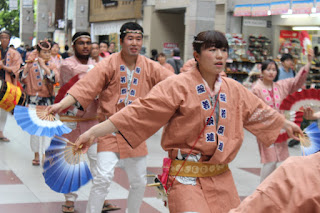Report:
Arunava Acharyya (india)
On
14th May, I had the chance to see Aoba Matsuri for the second time since I have
come to Sendai. That said, it was a bit different this time in the way I
experienced the festival. This time around I had the chance to dance in the
festival with other Japanese people in the street. This dance known as the
Sparrow dance has been performed since 400 years in Sendai and I was lucky to
be a part of this long history.
 This
experience started with a practice session on 12th May at Yagiyama Shimin
Centre. Me and and my friend from China went together for the practice session.
When we arrived, there were already some people there and the practice had
already started. After sometime, we received the clothes in which we would
dance in the festival. After that we were told to join in the dancers and
follow their style and I am afraid they were way better than us. But
nevertheless we gave it a shot.
This
experience started with a practice session on 12th May at Yagiyama Shimin
Centre. Me and and my friend from China went together for the practice session.
When we arrived, there were already some people there and the practice had
already started. After sometime, we received the clothes in which we would
dance in the festival. After that we were told to join in the dancers and
follow their style and I am afraid they were way better than us. But
nevertheless we gave it a shot.
The teacher was kind enough
to help us in learning the basic moves of the dance. About 20 minutes later we
were told to take a break for around 10 minutes. During this time we interacted
with other people of the dance group. Then we started our 2nd and last session
of practice which lasted for another 15-20 minutes. After the dance session got
over, we changed back into our clothes and returned back feeling excited about
the upcoming dance on Saturday, that is, on 14th May.
Saturday
was a warm day with a bit of wind which made it easy to wear the traditional Japanese
clothes required for dancing in the festival. I had worn Yukata before but it
was first time wearing Happi. We had
already changed into our dance clothes and we reached near the starting point
where we were asked to meet. When we reached there, we saw that there were many
other groups lining up to dance before or after us. Also, we had been joined by
two more people, one of whom, had come all the way from Tokyo to participate in
this festival. We had half an hour before we started our dance so I spent this
time talking to other members of the group and getting to know them better. We
took some photos before we started our dance. Our dance started at around 1:30
pm at the entrance of the arcade.
At first, when we started I
started feeling a bit shy because I didn’t know the dance well. On top of that
there were hundreds of people looking. But as the dance progressed, I started
getting some confidence as I saw others dancing with each other. By the time we
reached the next intersection of roads and had to stop to cross, I was feeling
very confident to continue the dance.
 I
had support from other dancers who were encouraging me constantly throughout
the dance. We changed our positions while dancing and had to dance the whole
length of the arcade which is about 1.5 kilometres. The most interesting thing
was that this was the first time I crossed the whole arcade by dancing and not
by walking. After the dance got over, we exchanged our contacts and took our
farewell from the dance group.
I
had support from other dancers who were encouraging me constantly throughout
the dance. We changed our positions while dancing and had to dance the whole
length of the arcade which is about 1.5 kilometres. The most interesting thing
was that this was the first time I crossed the whole arcade by dancing and not
by walking. After the dance got over, we exchanged our contacts and took our
farewell from the dance group. By
the time we finished it was well past our lunch time so we decided to go for
lunch at an Indian restaurant named Ashirvad which is inside the arcade. The
lunch was good especially since we were starving. After a heavy lunch we were
going back to change our clothes during which time we came across a shop
selling Hyoutan-age. This food is made from fish paste and we couldn’t resist
trying one of these. So in spite of having a heavy lunch we ate one Hyoutan-age
each. The Hyotan-age was a bit sweet because of the fish paste but with the
crunchiness of a fry. With this, the perfect day ended with a perfect food and made
me experience some more of the rich culture of Japan especially Sendai.
By
the time we finished it was well past our lunch time so we decided to go for
lunch at an Indian restaurant named Ashirvad which is inside the arcade. The
lunch was good especially since we were starving. After a heavy lunch we were
going back to change our clothes during which time we came across a shop
selling Hyoutan-age. This food is made from fish paste and we couldn’t resist
trying one of these. So in spite of having a heavy lunch we ate one Hyoutan-age
each. The Hyotan-age was a bit sweet because of the fish paste but with the
crunchiness of a fry. With this, the perfect day ended with a perfect food and made
me experience some more of the rich culture of Japan especially Sendai.仙台・青葉まつり
リポーター:アルナバ
アチャーリャ(インド)
5月14日、仙台に来てから2度目の「仙台・青葉まつり」を見る機会がありました。と言っても、まつりの体験の仕方が今度は少し違いました。今回は、商店街通りで日本の方々と一緒にまつりで踊ることになったのです。「すずめ踊り」として知られるこの踊りは、仙台で400年も前から行われてきたといいます。私はその長い歴史の一部に触れることができてラッキーでした。
今回の「すずめ踊り」体験は、5月12日、八木山市民センターでの練習会から始まりました。私は中国人の友人と一緒に練習会に参加しました。私たちが到着したとき、すでに何人かが練習を開始していました。
しばらくしてから、私たちはまつりで踊るときに着るための衣装を受け取りました。その後、踊り手さんたちと一緒に、やり方を見ながら参加してみるよう言われましたが、彼らは私たちよりもずっと上手です。それでも私たちはやるしかありません。 先生は「すずめ踊り」の基本の動きを学ぼうとしている私たちに親切に教えてくれました。20分ほど練習し、10分ほど休憩です。休憩の間に(すずめ踊りの)グループの方々と話をしました。そしてまた2回目、3回目の練習を15~20分ずつ行い、練習会は終了となりました。私たちは着替えをし、5月14日土曜日、もうすぐ開催される本番を思ってワクワクしながら帰りました。
土曜日は風も強くなく暖かい日で、「すずめ踊り」用の日本の伝統的な衣装を着るのにちょうどよかったです。浴衣は着たことがありますが「半被」を着るのは初めてです。私たちは早々に「すずめ踊り」用の衣装に着替え、待ち合わせ場所の出発地点に到着していました。私たちの前にも後ろにも、たくさんのグループが並んでいました。また、私たちのチームにもう2人参加したのですが、そのうちの一人はこのまつりに参加するために東京からはるばる来ていました。私たちが踊り始めるまでに30分ほど時間があったので、自分たちのグループの他のメンバーと話をしながら過ごし、より親しくなることができました。踊りが始まる前に写真も撮りました。私たちの「すずめ踊り」はハピナ名掛丁商店街のアーケード入口から午後1時30分頃に始まりました。最初のうちは、踊りがよくわからずに少しためらいがありました。その上、たくさんの人たちが見ているのです。それでも踊り進めていくうちに、他の人たちの踊りをお互いに見ながら、私もだんだん自信がでてきました。次の交差点に出て信号待ちをする頃には、かなり自信が持てるようになりました。踊っている最中ずっと励ましてくれた他のメンバーたちのおかげでもあります。私たちは踊りながら位置を変え、約1.5kmある長いアーケードをずっと踊って進んでいかなくてはなりません。アーケード全体を歩いてではなく踊りながら通ったのは初めてで、何よりもおもしろい体験でした。踊り切った後、私たちはすずめ踊りグループのみなさんと連絡先を交換して別れました。
「すずめ踊り」が終わった頃にはお昼時間をとっくに過ぎていました。私たちはアーケード内にある「AASHIRWAD」というインド料理店に行くことにしました。とても空腹だったせいもあり、ランチはおいしかったです。ボリュームのあるランチを食べた後、着替えをするために戻っていたら「ひょうたん揚げ」を売っているお店に行き当たりました。「ひょうたん揚げ」は魚のすり身から作られています。わたしたちは食べてみずにいられませんでした。たっぷりランチを取った後でしたが、私たちはみんな「ひょうたん揚げ」を1本ずついただきました。魚のすり身がほんのりと甘い、カリッとした揚げ物です。このように、その日は日本、とりわけ仙台の豊かな文化について体験することができ、すばらしくおいしい食べ物で締めくくった完璧な日になりました。




0 件のコメント:
コメントを投稿